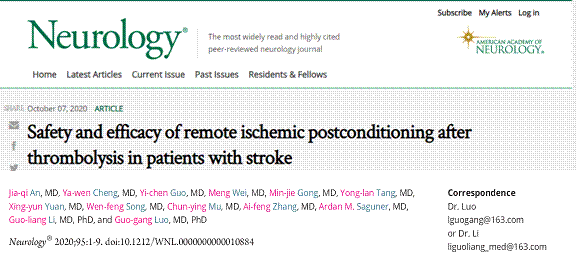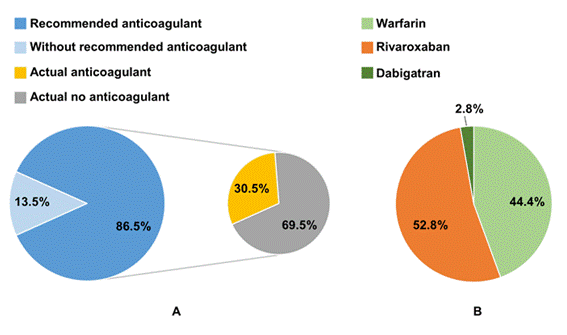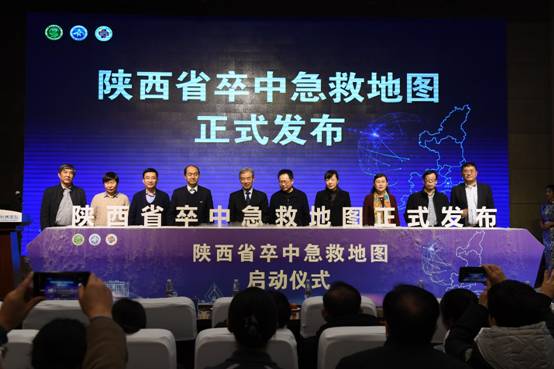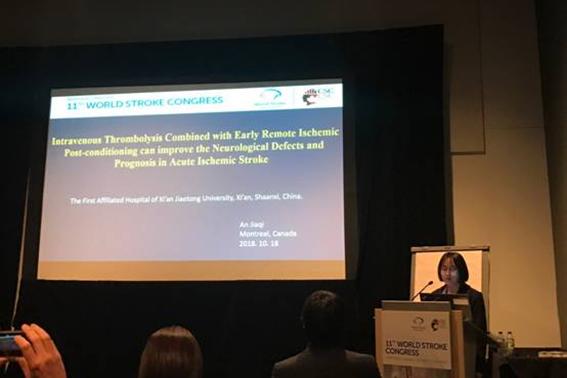On October 7, the teams led by Luo Guogang from Stroke Center-Department of Neurology of the First Affiliated Hospital of Xi’an Jiaotong University (XJTU) and Li Guoliang from Atrial Fibrillation Center-Department of Cardiovascular Medicine of our hospital cooperated with other scholars from multiple countries to complete a randomized controlled trial (RCT) and jointly publish an article entitled "Safety and efficacy of remote ischemic post-conditioning after thrombolysis in patients with stroke" in Neurology. The findings in this study suggested that for patients with acute ischemic stroke caused by atrial fibrillation and non-atrial fibrillation, patients who received intravenous thrombolysis with recombinant tissue plasminogen activator(rt-PA) combined with early-stage remote ischemic post-conditioning (RIPC) obtained significant improvement in the recovery of neurological function and clinical prognosis compared with their counterparts treated with intravenous thrombolysis alone.
Professor José G. Merino, Editor-in-Chief of Neurology, recommended this article as Press Release Program of this issue, and published a relevant Commentary entitled "Could arm squeezes with blood pressure cuffs help the brain recover after stroke?". In view of the originality and clinical practicability of this project, with the assistance of International Exchange Office of our hospital, principal researchers from Stroke Center and Atrial Fibrillation Center who participated in this project were invited to interpret the research results for interview by international media, such as Reuters,Health Day and Technology Networks.


The teams led by Luo Guogang from Stroke Center and Department of Neurology and Li Guoliang from Atrial Fibrillation Center and Department of Cardiovascular Medicine established partnership to explore novel methods to improve clinical prognosis and accelerate neurological function recovery of patients with acute ischemic stroke, especially for those with atrial fibrillation complicated with acute ischemic stroke. RIPC refers to the short-term peripheral ischemia caused by arm squeezes after acute ischemic stroke, thus preventing reperfusion injury and direct injury after cerebral ischemia. The results of this study demonstrated that RIPC induced by arm squeezes can significantly improve clinical prognosis of stroke patients, especially for those with stroke complicated with atrial fibrillation. These patients tend to show larger infarction size and achieve worse clinical prognosis. This study provides basic evidence for the application of RIPC, aiming to bring clinical benefits to more patients, and enhance the acute treatment and secondary prevention management of patients with acute ischemic stroke caused by atrial fibrillation and non-atrial fibrillation.
Stroke Center and Atrial Fibrillation Center of the First Affiliated Hospital of XJTU are the first and corresponding affiliations. Professor Luo Guogang and Dr. Li Guoliang are the co-corresponding authors, and An Jiaqi, a doctoral student supervised by Professor Luo Guogang and Dr. Li Guoliang, is the first author. Professor Ardan M. Saguner from University Heart Center Zurich in Switzerland, Dr. Zhang Aifeng from Brigham and Women's Hospital of Harvard University in U.S., and physicians from Stroke Center and Department of Neurology of our hospital also served as the authors. This work was financially supported by the Surface Project of Clinical Research Center of the First Affiliated Hospital of XJTU (XJTU1AF-CRF-2018-015; XJTU1AF-CRF-2016-013).

Stroke Center of our hospital attended the launching ceremony of the First-aid Treatment Map on Stroke in Shaanxi Province

Dr. An Jiaqi was invited to attend the 11th World Stroke Congress held in Montreal, Canada.
Article links:
https://n.neurology.org/content/early/2020/10/07/WNL.0000000000010884
https://medicalxpress.com/news/2020-10-arm-blood-pressure-cuffs-brain.html
https://link.springer.com/article/10.1007/s12325-020-01469-w
https://www.physiciansbriefing.com/neurology-9/heart-stroke-related-stroke-353/remote-ischemic-postconditioning-may-aid-stroke-recovery-761876.html
https://www.technologynetworks.com/neuroscience/news/brain-protection-after-stroke-may-be-helped-by-blood-pressure-cuffs-341377